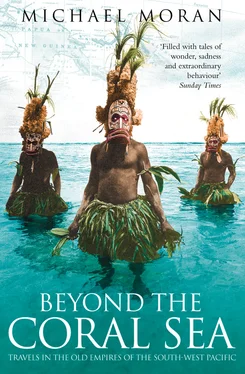1 ...8 9 10 12 13 14 ...24 The Highlands up to this time had been considered uninhabited. In 1933 an Australian adventurer named Mick Leahy and his young brother Dan, together with the patrol officer, Jim Taylor, flew over the inaccessible Wahgi Valley for the first time in a Junkers aircraft and saw signs of intensive agricultural settlements. This valley was perhaps twenty miles wide and sixty miles long and contained a long meandering river. To discover if it contained gold they decided to explore on foot. The spectacularly-decorated local people wearing the brilliant plumes of Birds of Paradise had never seen white men and regarded them as their returned spirit ancestors descended from the skies. They in turn were impressed by the appreciation shown by the ‘wild men’ for Italian opera, played on a wind-up gramophone. The power of art effortlessly to cross cultural boundaries was commented upon until a little translating from the indigenous tongue revealed that the sounds emerging from the trumpet reminded the warriors of the screams of women selected for cannibal feast. Mick Leahy made further expeditions, but gold eluded him to the last. He gave an entertaining paper in 1935 in London at an evening meeting of the Royal Geographical Society where he described warriors with dried snakes and finger joints hanging from their ear-lobes.
A number of them have an eye shot out. We concluded that they were peeping round the shield at an inopportune moment …
Mick himself had peeped into skull racks shaped like dovecotes. The Fellows awarded Leahy the prestigious Murchison Grant for his explorations. He is remembered as a dashing, romantic explorer who took brilliant photographs and filmed some of the most astounding footage of Stone Age people encountering Europeans for the first time. New Guinea provided a rich vein for what might be termed ‘Macho Adventure Writing’. The American author Jack London sailed the Snark through Melanesia in 1908. In his strange story The Red One published in 1918, he is unashamedly excessive throughout, continuing the general fascination with ear-lobes:
… her sex was advertised by the one article of finery with which she was adorned, namely a pig’s tail, thrust through a hole in her left ear-lobe. So lately had the tail been severed, that its raw end still oozed blood that dried upon her shoulder like so much candle-droppings.
During the Second World War all the islands of the Bismarck Archipelago fell quickly to the Japanese. The arrival of the Americans with their enormous quantities of ‘cargo’ had a profound impact on the local population. Even more influential was the equality with which they saw ‘black’ American servicemen treated by their white comrades. The notion of colonialism became an anathema in the post-war world. Australia was influenced by a United Nations recommendation in 1962 to prepare the country for independence. Russia under Khrushchev derided colonialism on the international stage with cutting invective. To the villagers of Papua and New Guinea, all the foreign powers were equally heartless intruders.
Every white man the government send to us
Forces his veins out shouting
Nearly forces his excreta out of his bottom
Shouting you bush kanaka 1
KUMALAU TAWALI, from ‘Bush Kanaka Speaks’
Less abusively, but with a fiery idealism, my friend John Kasaipwalova, the poet and student radical, urged the destruction of the colonial yoke:
Reluctant flame open your volcano
Take your pulse and your fuel
Burn burn burn burn
Burn away my weighty ice
Burn into my heart a dancing flame.
JOHN KASAIPWALOVA, from ‘The Reluctant Flame’
In 1975 full independence from Australia was finally achieved. It was gained without bloodshed, revolution or violence. This in itself was a significant tribute to Melanesian tolerance.
In the decade following independence, economic and trade links with overseas countries were successfully established. Papua New Guinea has received over 10 billion dollars in development aid from Australia since independence was achieved in 1975. In recent years, however, the promising legacy of a Westminsterstyle government has degenerated through cultural hybridisation into a desert of self-interest, nepotism, corruption and violence. The development of wantokism , 1 which evolved quite understandably from traditional community and family ties, is deeply at variance with the notion of ‘fair’ individual enterprise and parliamentary democracy. An egalitarian culture of mutual support dedicated to subsistence survival has clashed with the European individualistic, dividend-driven market economy creating a climate of desperate contradictions. There are no beggars in Papua New Guinea and, unlike many nations, no one would ever starve. The land is rich and fertile, the clan loyalties strong. Yet traditional cultures can no longer supply solutions to the types of internal and external dilemmas posed by the modern world.
Admiral Sir William Goodenough, the chairman of the 1935 meeting of the Royal Geographical Society addressed by Mick Leahy, clearly had a premonition after the paper was read when he commented:
How far and in what direction is the march of man going to interfere with these people? Every possible care should be taken that the people of New Guinea and their country are not exploited in any way.
True values of independence and respect for kastom are struggling hard to survive in the hearts and minds of the new generation growing up in the Bismarck Archipelago.
1 My great-uncle, then Lieutenant N. T. Svensen, was an officer in the 15th Battalion (Queensland) 4th Infantry Brigade, Australian Imperial Force, that landed at Anzac Cove on the Gallipoli Peninsula on the evening of 25 April 1915. He made an entry at 6.47 p.m. in his meticulously-detailed diary, written by moonlight on a torpedo boat heading for the beach. ‘We are under shrapnel fire and two or three men have been hit already, one bullet within 18 inches of my foot.’ He distinguished himself in the campaign, was wounded and repatriated to Cairo.
1 The term ‘Austronesian’ refers to one of the two major language groups in Melanesia. The other, older and more complex group is known as Non-Austronesian or Papuan. Austronesian may have originated in South-East Asia and all of its languages have a family resemblance, unlike the enormous diversity of the Papuan languages. Austronesian languages are spoken in Indonesia, Polynesia, Micronesia, the Philippines, Malaysia, Vietnam and Taiwan.
1 This historical word had a Hawaiian origin meaning ‘man’. A ‘bush kanaka’ was a Pacific Islander employed as an indentured labourer in Australia on the sugar plantations in Queensland. It came into more general colonial usage throughout Papua and New Guinea for any labourer. Initially a neutral word, it evolved into a rough form of colonial abuse, much resented by native labourers. It was also used in the islands as a term of what might be called ‘affectionate abuse’, so beloved of the Australian male when addressing each other or local ‘mates’, viz., ‘Come and have a beer you bloody kanaka!’
1 Literally ‘one talk’ in Pidgin. People who share the same language, loyalties and cultural heritage. They perform shared activities and support each other as they come from the ‘same place’, village or province. The preferential nature of so-called wantokism is a source of much dissatisfaction in modern PNG and the explanation for numerous misplaced criminal accusations of nepotism in both the private and public sectors.
4. Death is Lighter than a Feather
Across the sea,
Corpses in the water,
Across the mountains,
Corpses heaped up in the field,
I shall die only for the Emperor,
Читать дальше












